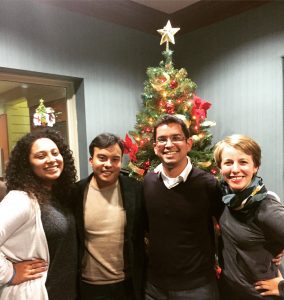
By Carlos A. Valenzuela, an Immigrant Justice Corps Fellow with the Safe Passage Project; Claire R. Thomas is an attorney with the Safe Passage Project and teaches at New York Law School; Ernie Collette is a Government Benefits and Immigration Attorney at MFY Legal Services; Marilyn E. Alvarado is a first generation college graduate from CUNY John Jay College of Criminal Justice and paralegal with Safe Passage Project; Michelle Castaneda is a Ph.D. Candidate in the department of Theatre and Performance Studies at Brown University. Her research focuses on theorizing the intersection of theatrical performance and the law.
Fatigue set in this morning. Tough to get out of bed. Tough to get ready. Tough to come into the detention trailer. Tough to hear the news of the day.
Today happened. Ernie’s client and her child were deported on the flight to Honduras in the middle of the night. They were woken up at 2 AM and put on a bus. Did they know what was going on? Where they were going? Did anyone explain anything to them?
Broken.
We all really thought that the second request for reconsideration, which Ernie so expertly drafted, would be at least read by DHS (Department of Homeland Security). Instead, CARA received a blanket denial on the requests for the clients we submitted last night. We received word in the middle of the afternoon that the woman who Carlos worked with had her request for reconsideration denied. Hopefully a stay of removal will prevent her from being put on a plane. Her claim is strong and she meets all elements. She wasn’t able to tell her story- the full story- before she was swept up in the deportation machine.
More broken.
We’re a mess today. But trying to be hopeful. It’s really tough. And it’s a really tough way to end this week.
Education for Girls; Stop judging
Today, we have been working on a request for reconsideration (RFR) for the woman Marilyn and I helped earlier in the week, whom I was with before the IJ and who was not able to share her story of childhood abuse and domestic violence at the hands of her husband until after her denials from both the asylum office and the IJ. We drafted a declaration for her, explaining her horrific history and why it was that she was unable to share her story in front of either adjudicator.
This woman has suffered so much abuse. She’s in pain- both emotional and physical. I can’t even begin to imagine what she’d been through. And as we were talking, both yesterday and then today, I realized that she brought her son, aged 12, with her to the United States and left her daughter, aged 15, behind in her home country. Would her daughter be safe? She would be safe because she would work in the fields. She wouldn’t travel to school like the boys did. That’s why the boys had problems with the gangs. Girls stay home.
I shouldn’t assume anything; I shouldn’t judge anyone. I don’t know the full story, I don’t know what my client is thinking. I won’t ever understand. I’m not her. And I need to get f—k over it. But it was so damn hard not to judge a woman who had left her young daughter in a very dangerous situation, and denied this girl an education.
And yesterday, spend the afternoon working with an Afghan woman who was persecuted because her in-laws’ family supported co-educational opportunities for girls in an area of Taliban rule. A woman who fought to have an education and to help other girls obtain an education.
Hard to wrap my head around these two very different situations. Difficult to not judge. Trying the best that I can. Feeling broken.
Stopping the Deportation Machine
Marilyn and I are trying to stop the deportation machine for the woman I described above, by drafting her declaration and her request for reconsideration (I will still be working on this tomorrow from NYC!) I can only imagine what the client is feeling. We were feeling really depressed about all of this.
Today, we tried to accomplish something. We finalized this client’s declaration, read it to her, incorporated her edits, and had her sign it. She is seeing a psychologist here at the facility, and we had her sign medical releases. Small steps. But these steps were very meaningful for the client, in terms of re-explaining the incredibly complicated process of what will happen next. We re-introduced her to the CARA staff, so that she will know with whom she will be interacting next week. She thanked us and wished us a Merry Christmas. We told her we’d be sending emails to CARA staff to check in on her (and that I’d be working on her legal case from NYC). Hopefully it makes a bit of difference to know that there’s someone thinking about her.
The New Administration?
Law@theMargins asked us to ponder a reflection piece about the new Administration. Honestly, as crazy as this sounds, the potential horrors of the new Administration are actually something I have NOT thought about during my time in Dilley. Why not? Because this situation is so bad that I can’t actually comprehend it getting any worse. Though I know that it could be worse; a lot worse.
Rights don’t matter if you can’t access them
I came to this realization last February, when I first came to Dilley. And it’s still very true today. Carlos told me the story of an indigenous Guatemalan woman he interviewed today who was turned back from a port of entry twice. She tried to enter the United States on the International Bridge at Brownsville, Texas. She was told first, that there was a “party going on” and that “No one’s being allowed in right now.” The second time, she was told “The U.S.is full. We won’t let you in.” She was with her 8-year-old son. They stated that they were afraid. They then crossed by the river, and then were detained and sent to Dilley.
Broken- the system is broken.
This woman and her child did everything correctly under both domestic and international law. They exercised their right to seek asylum. They came to a port of entry (International Bridge), expressed a fear of returning to their home country, and instead of being given a credible fear interview, they were simply pushed back. Twice. They were afraid to go back to Guatemala, so they crossed into the United States illegally via the river. They were not allowed to access their rights.
Angry.
How the f—k do you not cry?
Marilyn asked me this on Wednesday, otherwise known as sexual violence story day. There was so much pain on Wednesday. And so many tears. And after the second time we had a woman sobbing to us for hours on end, Marilyn asked me this. The only answer is that I’m not entirely sure, but that when someone else breaks down in front of me, I’m instantly in care taker mode and it’s unlikely that I will cry at that moment. It doesn’t mean that I won’t empathize; it doesn’t mean that I won’t feel; it doesn’t mean that it doesn’t affect me.
The four of us sat around our little dinner table in my room in the trailer talking about this. Some of us cry with our clients, some of us cry alone. I tried to remember how I was back in 2009, when I started doing this work at African Services Committee. Have I become something different than when I started?
Thank you for reading. More reflection pieces to follow from all of us. I’m at a loss for words to truly describe this horror show, and can only imagine what will happen come January 20th.
La lucha sigue,




